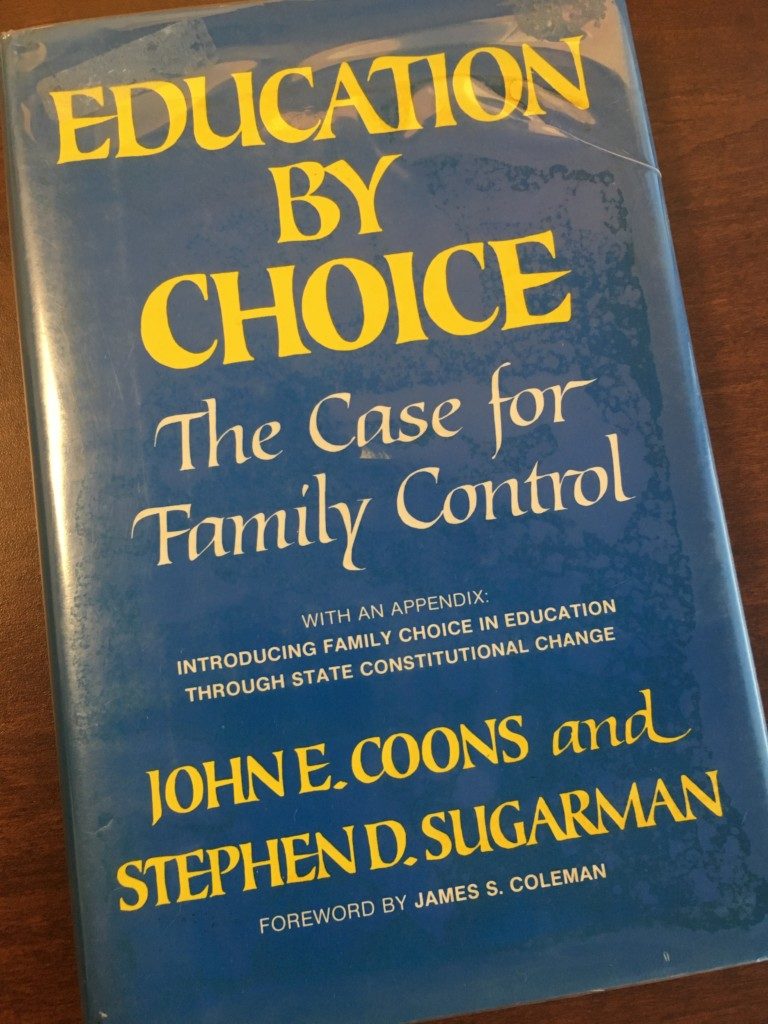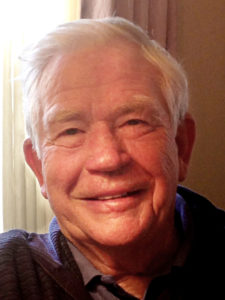
Coons: "What government has done is properly to recognize minimal education as a parental duty, but then improperly arranged its provision by a de facto conscription of families of lower income. "
The humble interim editor of this worthy school choice blog, one Ronald Matus, recalls to me the 40th anniversary of a certain book, “Education by Choice: The Case for Family Control” (University of California Press, 1978), hereafter EBC. I am to call up its conception, its ideological focus, its faults and future.

Jack Coons, pictured here, co-authored "Education by Choice" in 1978 with fellow Berkeley law professor Stephen Sugarman. It remains a must read.
To begin, my Berkeley colleague and collaborator, Stephen Dwight Sugarman, and I had already co-authored two books on school finance, the first with William Clune, long a professor at Wisconsin, and, like Steve, my student at Northwestern in the ‘60s. “Private Wealth and Public Education” (Harvard, 1970) was our expose of the irrationality of our then state systems of school finance. A substantial segment of that book was devoted to a critique of Milton Friedman’s pure market conception of subsidized parental choice. Still needed, we argued, was a full account of the arguments from all sides of the question of just why and how to truly empower the lower-income parent.
The second book, “Family Choice in Education” (Institute of Government Studies, 1971), was essentially the text of a model statute for parental choice with substantial comment by Steve and myself upon each section. The model presupposed the participation of public as well as private schools in the market created by vouchers.
The question of subsidized choice was, by then, in the academic air. What remained to be written, we supposed, was a more accessible display and critique of the various arguments for and against choice, one addressed to all serious readers. The existing literature was good but remote, academic and largely unread. The possible exception was Friedman’s brief but classic portrayal of an unregulated system that would bestow vouchers of the same dollar value upon parents of every income level. The idea was simple, clear and attractive – but a bit too much so.
I had known Friedman rather well in Chicago. He had been an oft-repeated guest on my half-hour weekly radio show – later I appeared on his television show. Both of us had, in the late ‘60s, moved west to the Bay – he to San Francisco, I to Berkeley, where Steve was soon to be my colleague. About 1973, the latter and I concluded that the market of serious readers deserved a more complete and accessible argument for a form of parental choice more inviting than that of the “libertarians,” a system that would take a form more engaging for political centrists. It would describe a form of governmental engagement that would in practice empower those parents of low or modest income who had for so long suffered de facto conscription of their child by the public system – literally segregation by wealth.
So at last came EBC in 1978; and at long last I have re-read it. I feel the satisfaction typical of geezers who rediscover, then relive, something to be proud of, some deed or artifact that is still in the game. EBC now appears to me sufficient as a battle plan for beginning the rescue of the conscripted parent and child, not trying to exterminate public education but, rather, inviting it to become truly public. This just might be a time and place where interested parties can join freely in common cause – the enhancement of young lives, the professionalization of education, the strengthening of families and the good of the civil order.
The book has its limitations – even faults! A bit too often we sound too certain about what are in fact somewhat unpredictable consequences of choice; on occasion we simply assume that, in due course, any sort of experimentation with choice with ratify our predictions. As I mature (I’m 89), I become more ready to recognize that I am sometimes moved much more by the moral bases for choice than by predictable outcomes. My head has, now and then, conceded to my heart; and, more, like any lawyer, I look on my client’s best side. This tendency should, of course, be quelled by honest concessions to the opponents – the teachers unions, the school administration, the conscriptive bureaucracy. Here, again, I have been careless. Nevertheless, on the whole EBC, in both its substance and tone, seems to pass the test. No doubt Steve kept any reckless wanderings of mine under reasonable control. The book is in general concessional where appropriate – and seldom merely crabby.
One element that gladdens my ego: Steve and I had worked out in detail how school districts – and government in general – could, by contract, entrust educational choice to what would be essentially private providers. Such schools, so popular with parents today, are quite properly known as “charters.” I had for some time berated myself for not using that label – “charter” – in our earlier work. It seems just right for the species. Happily, now, in my re-reading, “charters” sprang out at me from EBC itself (e.g. p. 163) as at least one of the appropriate terms for such schools. I can now cease my jealousy of those Minnesota pioneers of choice who skillfully made the term common. (By the way, Parliament used the term in 1745 in its funding of tuition for those Irish Catholic children who would attend Protestant schools; the latter were “chartered.”)
One ambiguity I now regret: On occasion in EBC we allow the government’s role in funding systems of choice to sound as if it were, in its exercise of power, “delegating” to the parent an authority that in fact no state in the union has ever enjoyed. We did not actually use that term, “delegation,” nor did we intend such a notion, but we should have more clearly described the parent’s authority as it truly is and has ever been in Western memory. No state has power (authority) to direct the parent in any matter so long as she avoids “child abuse.” The child, of course, has the right to his minimum, and government has the duty to protect him; and it is duty that sets the limits of what government can do with the abused or orphaned child, short of adoption.
What government has done is properly to recognize minimal education as a parental duty, but then improperly arranged its provision by a de facto conscription of families of lower income. I think EBC might have described this gross reality more clearly. The system’s true ugly nature will be consequential when the Supreme Court next deals with the question of choice for the ordinary and poor family.
I feel a bit uneasy, too, about our treatment of those schools of choice in the future whose teacher publicly criticizes its policy or practice. Is she, then, a proper object of penalty or dismissal? EBC comes off for me now as a bit too protective of the teacher. The problem might better be addressed by contract: if you, Miss Adams, must criticize how we do things, that’s OK – but, as agreed, you will not do so as our colleague. The public school teacher – even in the inner city, with its captive audience – has been altogether too protected by her union, and generally, by the law.
In writing EBC we missed a few tricks now happily made a growing part of the school scene by others. These include important options for reform such as tax credits for school choice. These have helped many families, but they seem to be only a useful band-aid; their economic limits are obvious and are essentially a trick play to suit the constitutional regimes of various states. Yet, again, within these limits, they are well serving many a family.
Educational savings accounts as well we did not foresee. To the extent that the grant is immediately available, they are, in truth, a form of voucher.
We did foresee the hope for Zelman v. Simmons-Harris (2002), and were to file amicus briefs when at last it appeared on the scene. Unless the present loci of power in Washington change radically, I anticipate more such briefs and more such victories for choice in the high court.
EBC has now been translated into Japanese with no apparent effect to date. Steve and I also have a contract with Chinese legal academics who plan to translate it into Mandarin. We keep our expectations there low; it seems a bit incongruous in the present political atmosphere of that interesting nation.
Intended as a blog, this piece of mine threatens to become a treatise, and I well conclude with a vain expression of confidence that “Education by Choice” will, at very least, continue to broaden the conversation about the nature and meaning of this hope for the authority of all parents. It is about something more than, and different from, a completely unregulated market. It is not the immediate consumer, the child, who gets to choose; hence the true question is who gets to dominate, the state or the parent? Steve and I recognized all parents – not just the rich – as manifestly the most humane and efficient locus of power. The state has long chosen to respect that reality for those who can afford to choose for their child. “Education by Choice” provided practical models for recognizing that hallowed principle in practice for the education of all children. It has, I think, been a useful instrument for widening and informing the audience and the gladiators in the coming seasons of political combat.